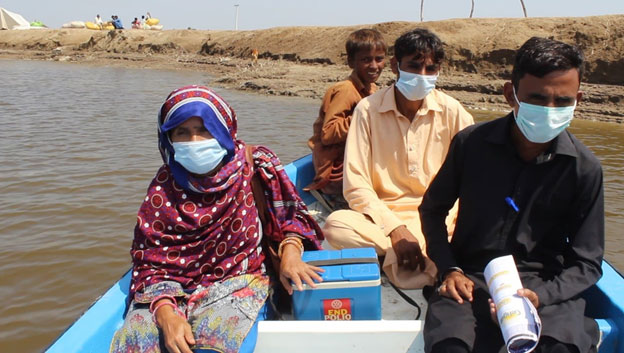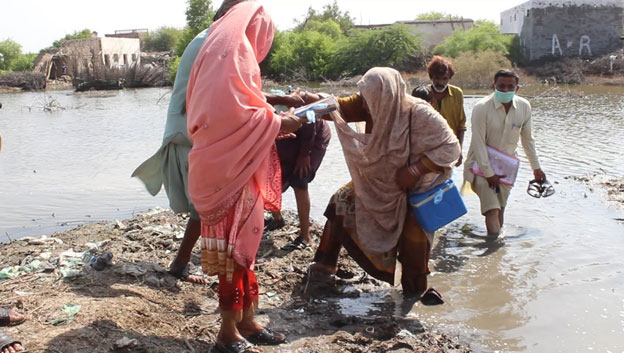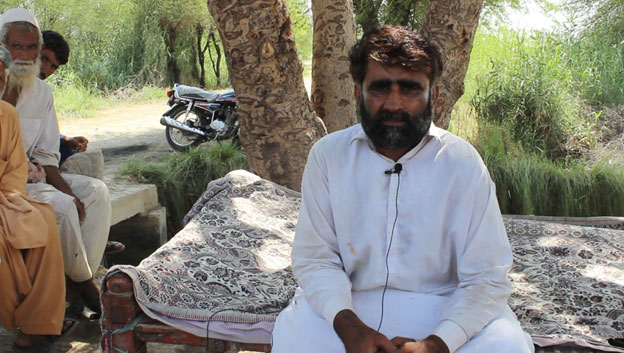Abid Hasan, Communication Specialist
Situated about 220 Kilometers west of Karachi, Mirpur Khas district in Sindh province was inundated with floodwater. In September this year it rained more than 400 millimetres which is double the yearly average rainfall; resulting in massive flooding across the district. Mirpur Khas is home to more than 1.5 million residents, and over 70 per cent of them reside in rural areas.
 Lady Health Worker Amina travelling by boat to reach children with polio drops
Lady Health Worker Amina travelling by boat to reach children with polio drops“At least 22 union councils were completely inundated with water and 600,000 people were either displaced or became inaccessible to us. A very large number had to be put in camps while numerous people had to live in makeshift housing on the sides of the roads,” said Abdul Wahid Sheikh, Commissioner of Mirpur Khas while talking about the way the floods wreaked havoc in the district.
“We faced a huge challenge to get polio drops to children in inaccessible areas. Also, we had many refusals because of demands related to flood relief,” Abdul continued while talking about the National Immunisation campaign.
The Polio Eradication Initiative (PEI), Pakistan and its frontline workers faced the challenge of inaccessibility head on and defied all odds in order to reach every child with essential polio vaccines during the National Immunization Week in September. The valiant lady health workers braved water, walked and swam through it and also used boats to reach children whose houses looked unreachable because of being submerged in water due to torrential rains.
Mud, stagnant water and vaccination
“It was extremely difficult. I tried to go through the water the first day and got stuck and struggled to make my way back. I tried again the second day, but almost drowned! However, as I was determined to vaccinate vulnerable children, on the third day I finally made it across the water and vaccinated about 30 children in this village,” said Amina, a Lady Health Worker who made her way to village Balejo Kum in Taluka Tando Jan Mohammad, some 80 kilometres from Mirpur Khas city despite flood water. Meanwhile in Taluka Sindhri, water is still stagnant and makes it difficult for health workers to access villages. Not only it is difficult to walk through the water, but the slippery mud also makes it almost impossible to navigate steadily. This, however, did not stop frontline workers Hawa and Sita to pass through it to reach four children who had missed the polio vaccine.
 Lady Health Worker Sita helping Hawa to get out of the muddy water LHW Hawa vaccinating a child in Sindhri, Mirpur Khash
Lady Health Worker Sita helping Hawa to get out of the muddy water LHW Hawa vaccinating a child in Sindhri, Mirpur Khash“I believe it is our duty to protect the future of Pakistan, it’s children and therefore, we will cross every barrier to reach them with life-saving vaccines,” said Hawa after reaching the cut-off village as she washed the filth off her feet that she had walked through.
“I thank these workers and am proud of them that they have gone through so much trouble to reach us. Yes, we are upset because of the floods but we must also safeguard our children,” said Halima, a grandmother of four.
Converting refusals, ensuring vaccination
Not everyone was ready for vaccination. At least 36 families refused to give their children the life-saving polio vaccine.
“People were very upset and angry. They asked why they should give polio drops when they didn’t have a roof over their heads and that they couldn’t go to their homes and also, they didn’t have mosquito nets. They demanded relief before they would inoculate their children, however using different strategies we covered all of them within two days,” said Muhammad Saleem Shaikh, Assistant Commissioner Mirpur.
These strategies included going from one village to the next and taking local, important influencers on board and using these influencers to emphasize the message that one should not endanger the health and lives of their children for other gains.
“It was very difficult. I went from village to village pleading with people and making them understand that the government is doing its best to provide relief but they simply cannot use this as a reason not to vaccinate their children,” said Haji Karim Bakhsh Shar, one of the leaders of the Shar tribe who were refusing the polio vaccine. With this intervention all children of the Hingorno Union Council received life-saving vaccinations.
 Chanesar Shar, Village Representative who initially refused vaccination, but changed his mind after meeting Haji Karim Bakhsh Shar
Chanesar Shar, Village Representative who initially refused vaccination, but changed his mind after meeting Haji Karim Bakhsh Shar“Yes, we refused! We refused because all our villages were under water and we wanted to bargain with the government. However, through polio staff and our tribal leaders, we understood that polio vaccination is extremely important for our children to be protected against the crippling disease of polio and therefore, shouldn’t be used as a bargaining chip,” said Chanesar Shar whose village had refused polio drops for their children due to demands for flood relief.
The PEI frontline workers, local administration, District Emergency Operations Centre and influencers – all ensured that every child is reached with the essential polio vaccine even in most inaccessible villages across Sindh, Pakistan despite harsh weather conditions, challenges of inaccessibility and demand-based refusals. The programme will continue to conduct large scale national and sub-national campaigns to reach around 40 million children under 5 years of age to interrupt poliovirus circulation and to work towards a polio free world.
